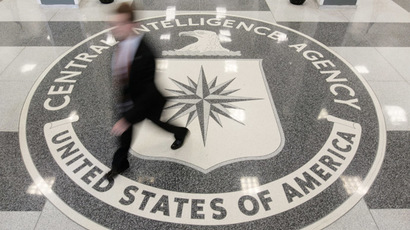CIA refuses to make torture report readable, blames Senate for delay

The Central Intelligence Agency is firing back at allegations that it is responsible for delaying the release of the Senate report on the controversial post-9/11 interrogation program, insisting that lawmakers themselves are to blame.
READ MORE: CIA torture far exceeded waterboarding, brought suspects 'to point of death'
While various Senators, including the Chair of the Senate Intelligence Committee, Sen. Dianne Feinstein (D-Calif.), have complained that the White House and the CIA are withholding “key facts” in the published version of the so-called "torture report", the agency argues this is not the case. The committee has been trying to have the report released ever since its completion in December 2012.
“The suggestion that CIA is delaying or obstructing the negotiations over redactions is patently false,” agency spokesman Ryan Trapani said to The Intercept. “The CIA has been doing all it can to bring the process to a conclusion as expeditiously as possible, in order that we can fully focus on the many threats facing our nation.”
Instead, Trapani said the senators’ “objections to the redactions” are what “have delayed the process.”
Trapani went on to dismiss claims that the agency has gone beyond reason in terms of redactions. He said the large majority of the torture report’s 500-page summary remains unredacted and appropriate for a release.
READ MORE: Obama’s chief of staff personally negotiates redacting of Senate’s CIA torture report
“The August 1 document was 85 percent unredacted,” he told the website. Feinstein “requested that additional information be declassified and unredacted. We have been working diligently to resolve differences and address her concerns. That process is ongoing and continues to this day.”
Among the items the two sides are negotiating over is the use of pseudonyms. The CIA claims that using these names could endanger officials, who could face violent threats if their identities are exposed. However, an unnamed Senate staffer for the intelligence committee said the CIA itself supplied the pseudonyms used in the report specifically in order to avoid identification.
Previously, senators also argued that keeping the pseudonyms is necessary to ensure the report is comprehensible. Without those names intact, the summary is virtually unreadable.
“The CIA, on behalf of the administration, provided us on August 1 with a version of the committee’s executive summary that was redacted to the point that Senator Feinstein determined it was unreleasable in its current form,” the staff member told The Intercept. “And in the ensuing weeks and months we have debated the issue and sought further unredactions, if you will. And the CIA/White House/Office of the Director of National Intelligence have collectively agreed to unredact or declassify a fair amount of information that we believe is necessary.”
The source added that senators are seeking further unredactions, and dismissed the CIA’s criticism that lawmakers are responsible for the fact that the report has yet to be released.
“There is no foot dragging going on … I’m speaking for us. We are not dragging our feet,” he said.
The statement by the CIA comes just one day after 12 Nobel Peace Prize winners wrote an open letter to President Barack Obama, urging him to release the torture report. They called for the “full disclosure to the American people of the extent and use of torture and rendition by American soldiers, operatives, and contractors, as well as the authorization of torture and rendition by American officials.”
READ MORE: Nobel Peace Prize laureates call on Obama to release CIA torture report
In September, anonymous sources stated that the report detailed interrogation tactics that went beyond waterboarding. In some cases, detainees were held under water “until the point of death.”
Over the summer, a leaked White House document suggested the report categorizes the CIA’s methods as “torture by a common definition.”
Meanwhile, other sources state that the report does not evaluate the role of former President George W. Bush or top administration officials in approving the CIA’s techniques.














